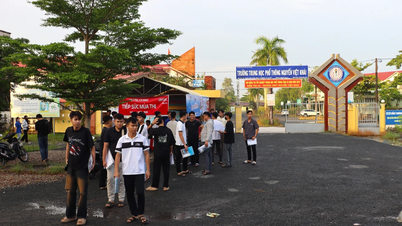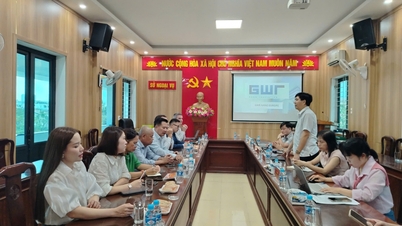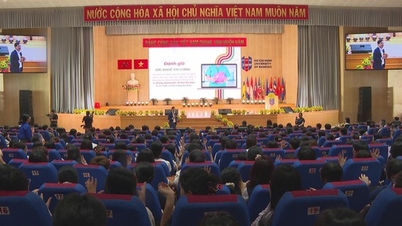Online Training: From Trend to Implementation Strategy
The development of technology and the national digital transformation policy have made online training a key strategy of many universities and colleges. This is not only teaching via Zoom, MS Team, but also an entire ecosystem including: a modern LMS system, a standardized digital learning material warehouse, a team of technology-savvy lecturers and a scientific operating roadmap.
At the same time, the legal corridor is also gradually being completed: Circular 08/2021/TT-BGDDT allows online teaching of up to 30% of the program; Circular 01/2024/TT-BGDDT requires each school to have at least 10% of courses ready for online. These regulations both create pressure and encourage facilities to invest more systematically.
Reality shows that many schools are still struggling to implement IT on their own with fragmented IT infrastructure, unstandardized lectures, slow implementation time and learning experiences that do not meet expectations.

Current trends in online training.
Steps to implement effective online training
Define goals and scope
Right from the start-up phase, educational institutions need to clearly define the objectives, scope of implementation and scale of learners for each phase. Focusing first on general courses with a large number of students and easy to standardize, along with selecting a pioneering faculty or group of lecturers to pilot, will help the school have a basis for evaluating effectiveness before expanding. At the same time, the ratio between online and direct training needs to be balanced to comply with regulations and be suitable for staff capacity and infrastructure.
Preparing the teaching staff
The success of online training depends largely on the instructor. In addition to expertise, they need to master digital pedagogy, know how to organize learning activities, test and evaluate in the digital environment and effectively exploit the LMS and supporting tools.
Choosing and investing in an LMS
Open source platforms like Moodle or Canvas remain popular because of their ease of initial setup, but they have limitations in terms of interface, mobile applications, customization, extensibility, and potential security risks from plugins.
Meanwhile, commercial solutions from domestic/foreign suppliers offer more flexibility but are prone to dependency, especially when schools lack technical experience from the beginning. Many schools only discover problems after a period of operation, leading to increased customization costs or even the contractor not continuing to support. Therefore, choosing an LMS needs to be linked to a long-term strategy, instead of following a temporary trend.
Building a high-quality digital learning resource warehouse
There are currently no specific regulations on developing e-lectures for universities and colleges. Schools can refer to Decision 3784/QD-BGDDT on developing digital learning materials and online courses on the MOOCs platform, in which learning materials need to include teaching scenarios, slides, reading materials, graphic design, infographics, explanations and assessment questions...
Instead of just filming the lecturers, schools should apply animation, motion graphics and SCORM interactions to increase the appeal. In the early stages, cooperation with professional production units will help ensure quality, while creating opportunities for the teaching staff to learn and gradually take the initiative to implement it themselves later.
Deployment planning
Schools should establish a specialized steering committee and coordinate closely with relevant units. Starting with a pilot of 2-5% of the courses, collecting feedback, and then gradually expanding will help the transition process go smoothly.
Lessons for schools
According to Mr. Nguyen Duc Binh - Director of OES Online Training Services Joint Stock Company (a unit that is consulting and implementing online training for hundreds of businesses, universities and colleges) - most schools make some common mistakes when implementing online training such as: Focusing too much on the "advanced" features of LMS but rarely using them; investing heavily in studios without a professional post-production team; letting lecturers produce their own learning materials, leading to low image quality and slow implementation. Recently, many units have put too much hope on AI as a "universal tool", while in reality, AI is only effective when applied properly in the learning materials production chain.

Master Nguyen Duc Binh introduces the topic of technology application in training.
Practice shows that online training is only effective when it is implemented comprehensively and has a clear roadmap. This is the key to helping schools not only meet regulations but also create sustainable advantages in the process of digital transformation of education.
Source: https://vtcnews.vn/kinh-nghiem-thuc-tien-trien-khai-dao-tao-truc-tuyen-cac-truong-dai-hoc-cao-dang-ar967353.html




![[Photo] National Assembly Chairman Tran Thanh Man chairs the 8th Conference of full-time National Assembly deputies](https://vphoto.vietnam.vn/thumb/1200x675/vietnam/resource/IMAGE/2025/9/29/2c21459bc38d44ffaacd679ab9a0477c)
![[Photo] Many streets in Hanoi were flooded due to the effects of storm Bualoi](https://vphoto.vietnam.vn/thumb/1200x675/vietnam/resource/IMAGE/2025/9/29/18b658aa0fa2495c927ade4bbe0096df)
![[Photo] General Secretary To Lam chairs the meeting of the Central Steering Committee on preventing and combating corruption, waste and negativity](https://vphoto.vietnam.vn/thumb/1200x675/vietnam/resource/IMAGE/2025/9/29/fb2a8712315d4213a16322588c57b975)
![[Photo] General Secretary To Lam attends the ceremony to celebrate the 80th anniversary of the post and telecommunications sector and the 66th anniversary of the science and technology sector.](https://vphoto.vietnam.vn/thumb/1200x675/vietnam/resource/IMAGE/2025/9/29/8e86b39b8fe44121a2b14a031f4cef46)






















































































Comment (0)